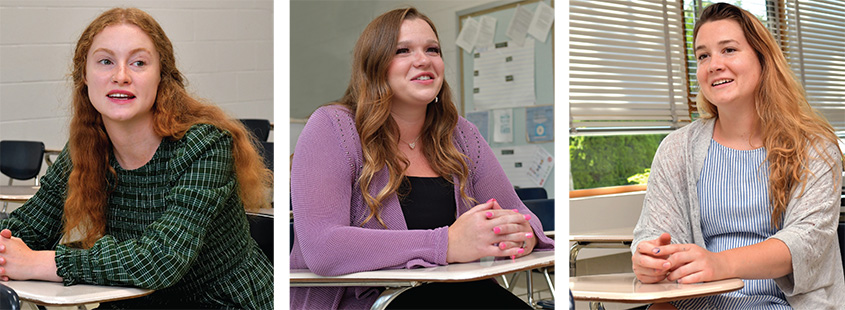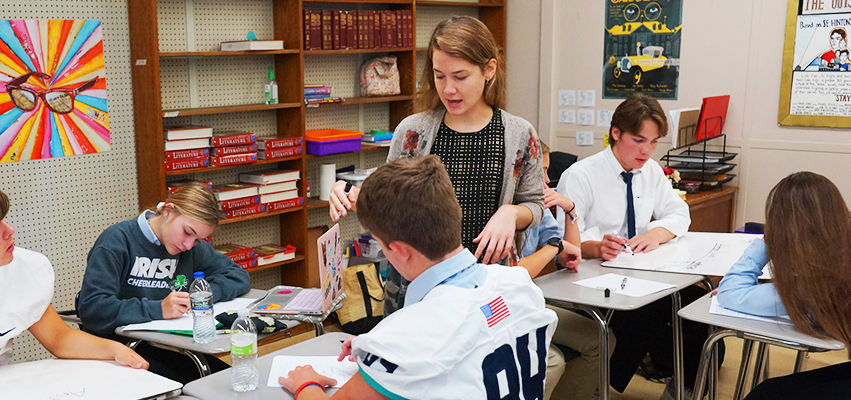
To be honest, it’s a lot of caffeine.”
That’s what Pekin-based preschool teacher Katie Daniels said when asked how she balances being in her 20s with maintaining her personal and social life and working a job that often requires 50 hours or more a week.
It was a common refrain among 20-something educators. Balance can be a high hurdle, one that can be addressed by finishing work at school and leaving the laptops behind, for example, or by just hanging out with fellow teachers who understand and empathize with the workload and schedule.
It’s no secret that being a teacher is no joke. A 2018 study conducted by the University of Pennsylvania found that 44% of private- and public-school teachers leave the profession within the first five years, giving new teachers the highest attrition rate among all other educator age brackets.
An EducationWeek study, meanwhile, reported that 92% of teachers believe their job is more stressful now than it was before the pandemic, and that they are spending an average of 30 hours plus a week on instructional planning alone.
Entering the workforce is never easy, but for new teachers, it’s more difficult than ever.
That hasn’t deterred these young educators. They’ve decided to teach, not because it’s easy, but because they love it.
Daniels and two other teachers, Sydney Young and Leah Daugherty, who work in Morton and Peoria, respectively, all exhibit a sense of joy regarding their careers. They are resilient, dedicated and full of laughter, especially when speaking about their students.
“It’s so wonderful to just be present in the classroom with them and watch them learn things … I don’t think students quite understand the impact they have on teachers,” Young explained. When asked what one thing they wished their students knew about, Daugherty and Daniels both said, “How much we care.”
They explained the immense amount of emotional labor that goes into teaching. For eight hours a day, they are responsible for tailoring their teaching styles and content to their students’ varying needs. While doing so presents the most challenging aspect of their jobs, it also provides the most rewarding moments.
Daniels specifically mentioned how much she loves the “a-ha!” moment when her 4-year-old students’ faces light up, realizing that they know how to spell their names all by themselves. For Daugherty and Young, who both teach high school, that moment arrives when their students ask for advice on college essays, pick their brains about their recent collegiate careers, or simply stop by their classrooms between passing periods.
An Ing Foundation survey found that 83% of Americans said they had a teacher who helped build their confidence, with 79% saying they’d had a teacher who encouraged them to pursue their dreams. These young educators put in the work so that their students can reap the benefits.
But it’s not just teachers in their 20s who make central lllinois school systems so effective. Daniels, Daugherty and Young couldn’t each expressed gratitude for their mentors and colleagues.
Being a 20-something teacher does present some interesting advantages when it comes to relating to students. “They assume my sense of humor is the same as theirs, and they’re right,” Daugherty said, laughing. And when they draw a disciplinary boundary, that shared experience also helps students understand that it’s not due to a lack of empathy, but rather because a line has been crossed.
That line can be pretty thin, though. Relating well to students also can easily be misconstrued as a case of diminished authority. Young joked about the “don’t smile until November” rule for first-year teachers, which suggests that rookie teachers should be more strict up front to prevent misbehavior in their classroom later on in the year. This same principle also can apply to parents, who often are quite a bit older than the 20-somethings teaching their children.
“They may be wondering what my credibility is or if can I do this job, but after they get to know me and I prove myself, then we form a good relationship,” said Daniels. For Young, a first-year teacher, sitting down at parent-teacher conferences is already old news: “They’re going to come in, they’re going to tell me they thought I was a high school student, and then we’re going to move on with the conversation,” she said.
And when being a young teacher presents unavoidable challenges, their more seasoned colleagues are always there to lend a hand. The ability to bounce ideas or anxieties off of fellow educators who have been in their shoes before has been invaluable. In the few instances where parents have attributed a disciplinary action to Young’s age and lack of experience as a mother, her colleagues have been there to help her troubleshoot, talk through the conflict, and come to a resolution.
“We make each other’s lives easier and education far more interesting and worthwhile than it would be working on our own, isolated in our separate classrooms,” she said.
Indeed, Young said she expected an uphill battle when it came to being taken seriously as a first-year teacher, but what she has experienced instead is relentless support. “If you’re having a bad day, you have your coworkers there encouraging you and reassuring you,” Daniels said.
The desire for peer support is common among most teachers. A Rand Corporation study reported that 72 percent of teachers found frequent feedback from informal instructional observation to be extremely helpful in bettering their skills as an educator. Daniels, Daugherty and Young all say that they have become better educators not due to the absence of bumps in the road, but because of them.
Between the three, they are responsible for coaching volleyball, helping with the band, subbing for other teachers, directing the school musical, and moderating the Creative Writing and Cystic Fibrosis Foundation labs. In addition, they must navigate an educational landscape that is constantly evolving in the wake of social, political, economic and technological advancements.
The truth of the matter is, these teachers have chosen a career that presents incredibly unique challenges. But the good outweighs the bad, and they love it. At the end of the day, their students and colleagues make it all worthwhile.
So, how do you balance being a teacher with being in your twenties?
“At this point, I’m just doing it,” said Young.





